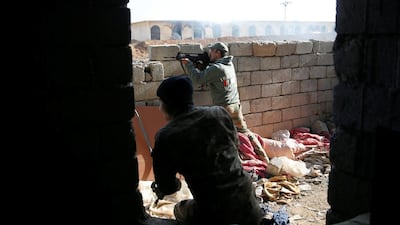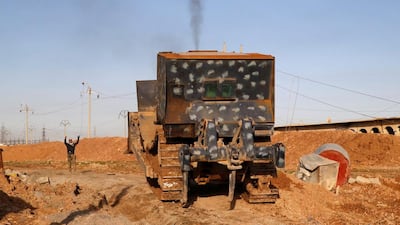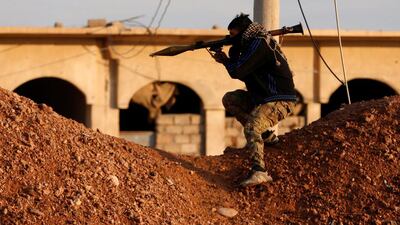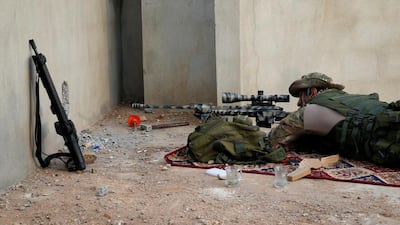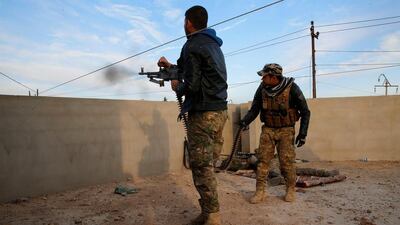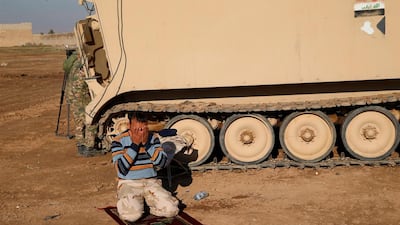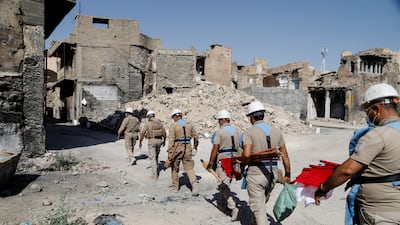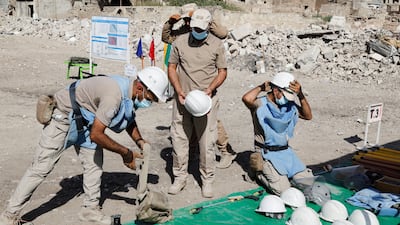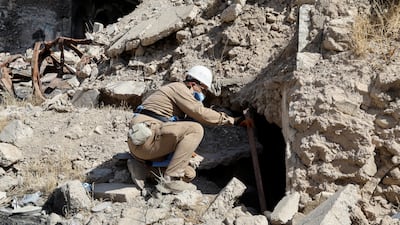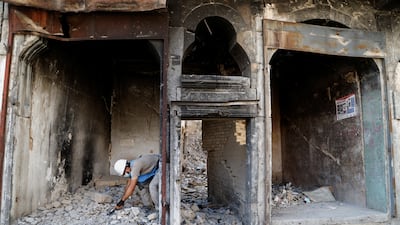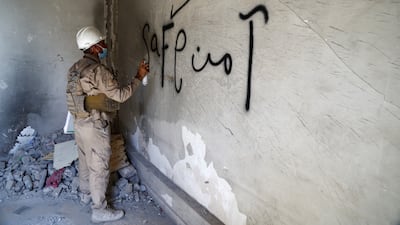Mosul has gradually come back to life during the five years since it was liberated from ISIS, yet much of the western side of the city remains in rubble because of poor governance and rampant corruption, officials told The National.
On Sunday, five years will have passed since former Iraqi prime minister Haider Al Abadi declared victory over the extremist group in the battle of Mosul, saying Iraqi forces had caused the “collapse of the terrorist state of falsehood.”
Mosul, in Nineveh province, is Iraq’s second city and, until Raqqa was recaptured by a Kurdish-led force in Syria, was the last bastion of ISIS’s failed caliphate between 2014 and 2017.
But swathes of the city had been reduced to rubble, with as many as 11,000 civilians dead and about 8,000 buildings destroyed or seriously damaged in the Old City alone.
It was a tragedy seen in other liberated towns, and three million Iraqis had been displaced by the time ISIS fell.
Mr Al Abadi said the challenge would be to “build,” and restore security, but in the five years since, progress has been decidedly mixed.
Corruption
“Corruption is the main reason why everything is delayed, [and] authorities have only rebuilt streets and pavements. It’s the Mislawis who have rebuilt their homes, cleaned their streets and worked to bring life back to the city,” Fahad Saad, a member of Mosul's council for public services, told The National.
Iraq was placed 160th out of 180 countries on Transparency International’s corruption perception index for 2020.
Mr Saad said much of the city remains shattered. Nawful Al Sultan, a former governor of Nineveh province, of which Mosul is the capital, was removed from office in 2019 and was widely suspected of corruption.
The US placed sanctions on him in 2020 for misusing public funds.
“The United Nations Development Programme suspended reconstruction projects after multiple allegations of Al Sultan siphoning off United Nations funds,” the US Treasury said when announcing the sanctions.
“Mosul’s airport is still in ruins. We don’t have any running hospitals, doctors are mostly working out of caravans or damaged buildings, some have been slightly reconstructed but not fully redone,” Mr Saad said.
The city is secure, he said, but damaged infrastructure is yet to be repaired or rebuilt, a result of “mismanagement by the local authorities.”
The right bank
The western side of the city, called the Right Bank by Iraqis, was hit hardest and unrecognisable after the war.
Home to much of the city’s treasured heritage, including the Great Mosque of Al Nuri with its leaning minaret, which was blown up by ISIS and is now being rebuilt with funds from the UAE, it has become a symbol of the war waged against the extremist group.
Thousands of civilians died there as neighbourhoods were hit by guided bombs from coalition aircraft, ISIS suicide car bombs and Iraqi heavy weaponry.
Far more densely populated than the east side — which escaped with far less damage, the west side was the chosen centre for the terrorists’ resistance but became uninhabitable when the guns fell silent, littered with bombs, bodies and rubble.
In the east of the city across the Tigris river, communities were able to return in large numbers to houses that in many cases were lightly damaged or unscathed.
Iraq soon restored government salaries to the east and before, the battle ended, some east Mosul markets reopened.
Much of what has been achieved has been down to the efforts of local people and overseas aid agencies.
At first, this was because Iraq was gripped by an economic crisis as the battle ended, with oil revenue dropping to $66 billion in 2017 compared to $92bn in 2014, at the start of the conflict.
The year the battle ended, total government revenue was $22bn short of the World Bank's estimated $88bn reconstruction cost for all of the war-damaged regions.
An international donor conference in February 2018 raised a fraction of this sum but enabled the UN Development Programme to repair most of the water and electricity infrastructure.
Progress has been patchy, Mr Saad said, adding that it has mostly been due to “collective public effort that has enabled life to return to the city, not the government”.
A government source told The National that Iraq now has the funds to rebuild, but the process has been slow because of a lack of good governance.
“We have what it takes to at least get public services back on track, but there are people at the top who benefit from the chaos,” the source said.
“We have been silent due to security reasons, I'm trying to do the best I can, but there are things out of my control.”
Iraq's monthly oil revenue hit a high in June at $11.5bn, soaring above the $8.79bn record set in April 2012. But the vast majority of the expenditure goes on salaries, and this year there has been almost no investment in vital services because Iraq's government has not yet formed, meaning that no budget has been passed.
Moving forward
The council in Mosul has taken on an initiative to build a private charitable primary school for children whose relatives were killed during the liberation battle.
The school is in Al Farouq Street in the heart of Mosul's old city, Mr Saad said, which is the area that was hit hard by the battle.

Construction of the building began in August 2021, and today it is nearly 75 per cent complete.
“This is the first of its kind in Iraq and the region where children will be supported by sponsors. The funds will go towards school’s operating expenses from teachers’ salaries, rent, water and electricity bills,” Mr Saad said.
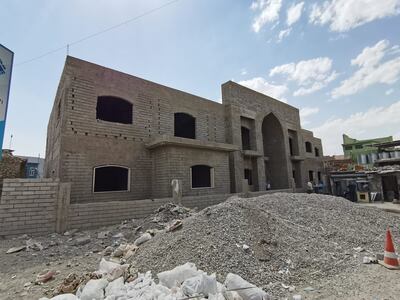
There will be no profit margins, said Mr Saad, only education for the children.
“The school will also be a cultural and social centre outside of official working hours, in which courses such as computing, craft workshops, psychological support will be offered to locals,” he said.

